Gluttony
by Sr Mary Magdalene Eitenmiller o.p
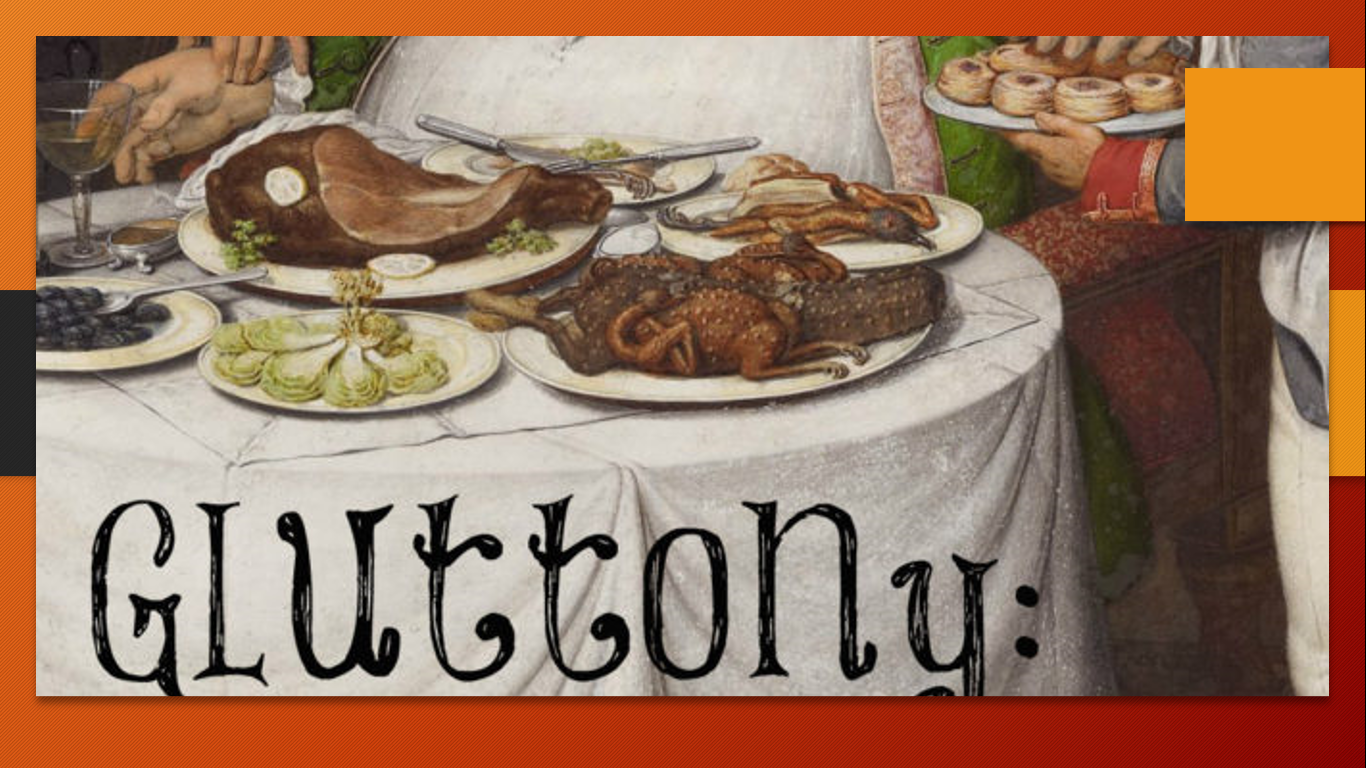 Tonight we will discuss the capital vice of gluttony. And I would like to begin with a few words from [SLIDE 2] “Evagrius Ponticus (c.346-399) in what is today modern-day Turkey. In order to deal with his personal sin, Evagrius retreated to the Egyptian desert and joined a cenobitic community of Desert Fathers. In AD 375, Evagrius developed a comprehensive list of eight evil “thoughts” (λογισμοι; logísmoi), or eight terrible temptations, from which all sinful behaviour springs.[1]
Tonight we will discuss the capital vice of gluttony. And I would like to begin with a few words from [SLIDE 2] “Evagrius Ponticus (c.346-399) in what is today modern-day Turkey. In order to deal with his personal sin, Evagrius retreated to the Egyptian desert and joined a cenobitic community of Desert Fathers. In AD 375, Evagrius developed a comprehensive list of eight evil “thoughts” (λογισμοι; logísmoi), or eight terrible temptations, from which all sinful behaviour springs.[1]
So in his work on the 8 vices, this ascetic Christian monk has some rather sharp words for those who fall into the vice of gluttony. He says, “Desire for food breeds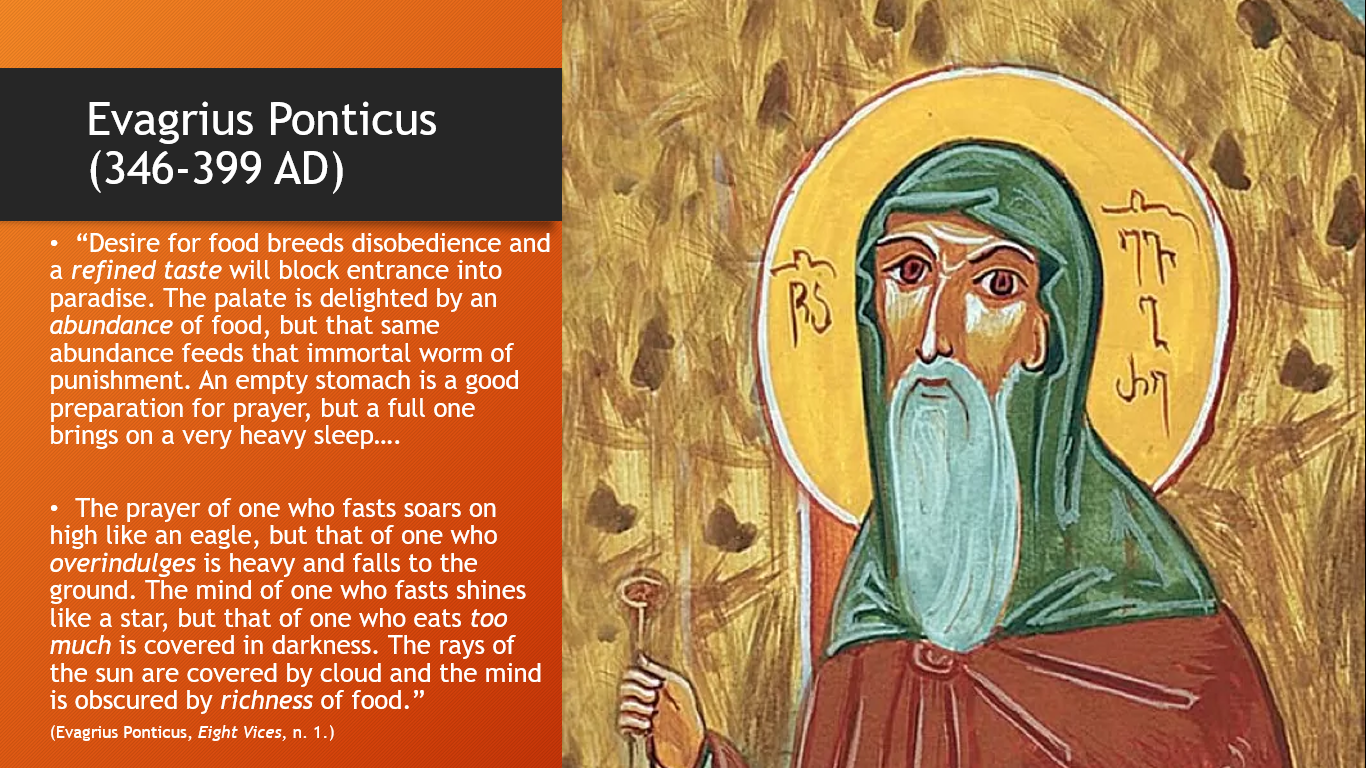 disobedience and a refined taste will block entrance into paradise. The palate is delighted by an abundance of food. but that same abundance feeds that immortal worm of punishment. An empty stomach is a good preparation for prayer, but a full one brings on a very heavy sleep…. The prayer of one who fasts soars on high like an eagle, but that of one who overindulges is heavy and falls to the ground. The mind of one who fasts shines like a star, but that of one who eats too much is covered in darkness. The rays of the sun are covered by cloud and the mind is obscured by richness of food.”[2]
disobedience and a refined taste will block entrance into paradise. The palate is delighted by an abundance of food. but that same abundance feeds that immortal worm of punishment. An empty stomach is a good preparation for prayer, but a full one brings on a very heavy sleep…. The prayer of one who fasts soars on high like an eagle, but that of one who overindulges is heavy and falls to the ground. The mind of one who fasts shines like a star, but that of one who eats too much is covered in darkness. The rays of the sun are covered by cloud and the mind is obscured by richness of food.”[2]
Now, if you notice, in these sayings Evagrius shows that gluttony can involve “refined taste,” “abundance, or too much food,” “overindulgence,” or also a certain “richness” of food. And this over-indulgence of food [and drink], or seeking out rich and delicate foods is understood by Evagrius as an obstacle to the spiritual life, particularly as an obstacle to prayer.
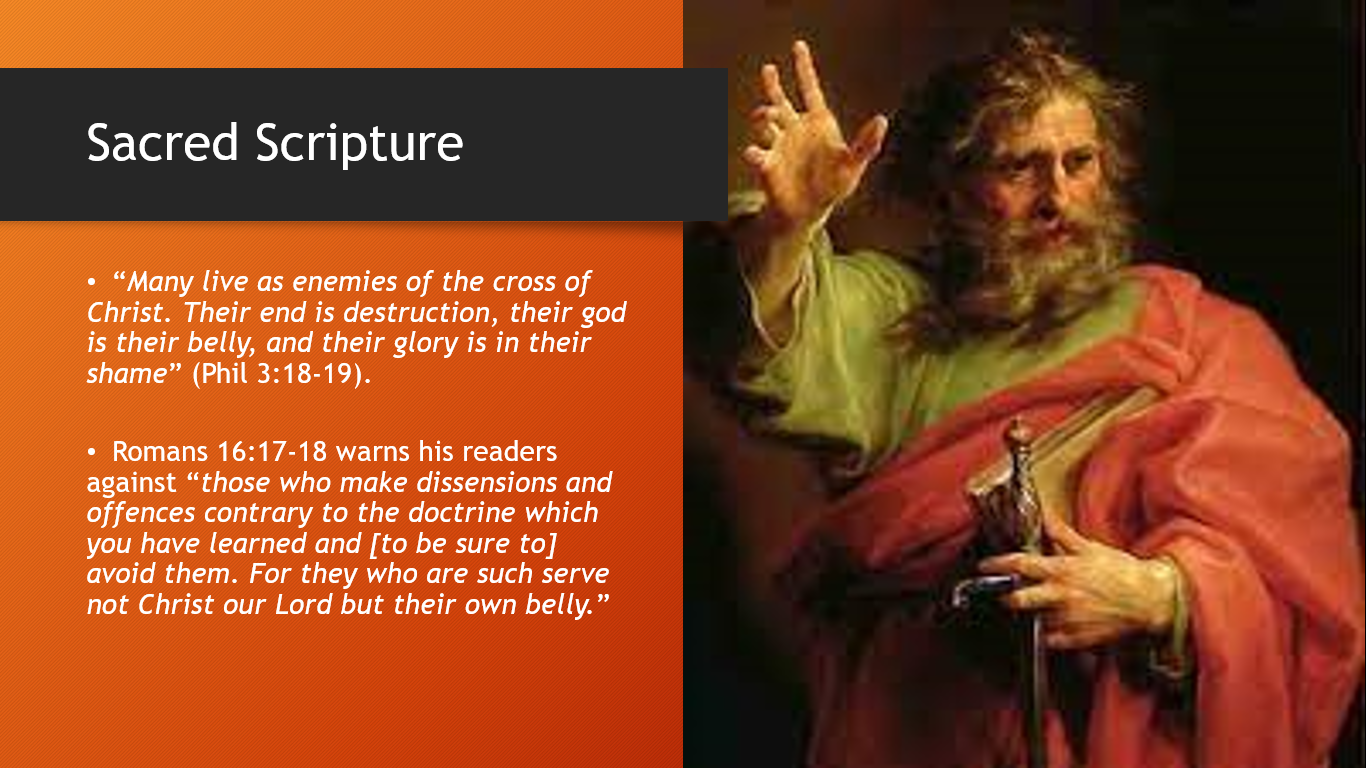 If we turn now to Sacred Scripture, we see that gluttony, as well as other vices, can also lead to a certain kind of idolatry. St. Paul warns the Philippians, “Many live as enemies of the cross of Christ. 19Their end is destruction, their god is their belly, and their glory is in their shame” (Phil 3:19). And in his letter to the Romans (16:17-18), he also warns his readers against “those who make dissensions and offences contrary to the doctrine which you have learned and [to be sure to] avoid them. For they who are such serve not Christ our Lord but their own belly.” In other words, as St. Thomas Aquinas explains, “They preached not for the glory of Christ but for revenue, in order to fill their belly.”[3]
If we turn now to Sacred Scripture, we see that gluttony, as well as other vices, can also lead to a certain kind of idolatry. St. Paul warns the Philippians, “Many live as enemies of the cross of Christ. 19Their end is destruction, their god is their belly, and their glory is in their shame” (Phil 3:19). And in his letter to the Romans (16:17-18), he also warns his readers against “those who make dissensions and offences contrary to the doctrine which you have learned and [to be sure to] avoid them. For they who are such serve not Christ our Lord but their own belly.” In other words, as St. Thomas Aquinas explains, “They preached not for the glory of Christ but for revenue, in order to fill their belly.”[3]
Of course, gluttony can affect not only my relationship with God, but also my relationship with others and with myself, as well. Sometimes the disordered desire for food can lead the glutton to ignore the needs of others. Solomon Schimmel, a professor and psychologist, tells in his book, The Seven Deadly Sins, of how a patient of his “obsessed with food, nearly ruined her family life. … For her… the psychological need for food became pathological. She spent so much time thinking and talking about food, and preparing and consuming it, that her affectionate and caring relationships with her husband and children were deteriorating. She couldn’t find time to assist her learning-disabled son with his homework. Her older daughter, who was going through an adolescent crisis and desperately needed a mother’s understanding was shunted aside because ‘mother is too busy now’ preparing large-scale dinner parties. The guests were ostensibly being invited over so frequently because ‘mother likes to maintain friendships’ but really as a rationalization for indulging in food…. She had become so food- and ego-centered that she was ignoring the legitimate needs of those she deeply loved.”[4]
lead the glutton to ignore the needs of others. Solomon Schimmel, a professor and psychologist, tells in his book, The Seven Deadly Sins, of how a patient of his “obsessed with food, nearly ruined her family life. … For her… the psychological need for food became pathological. She spent so much time thinking and talking about food, and preparing and consuming it, that her affectionate and caring relationships with her husband and children were deteriorating. She couldn’t find time to assist her learning-disabled son with his homework. Her older daughter, who was going through an adolescent crisis and desperately needed a mother’s understanding was shunted aside because ‘mother is too busy now’ preparing large-scale dinner parties. The guests were ostensibly being invited over so frequently because ‘mother likes to maintain friendships’ but really as a rationalization for indulging in food…. She had become so food- and ego-centered that she was ignoring the legitimate needs of those she deeply loved.”[4]
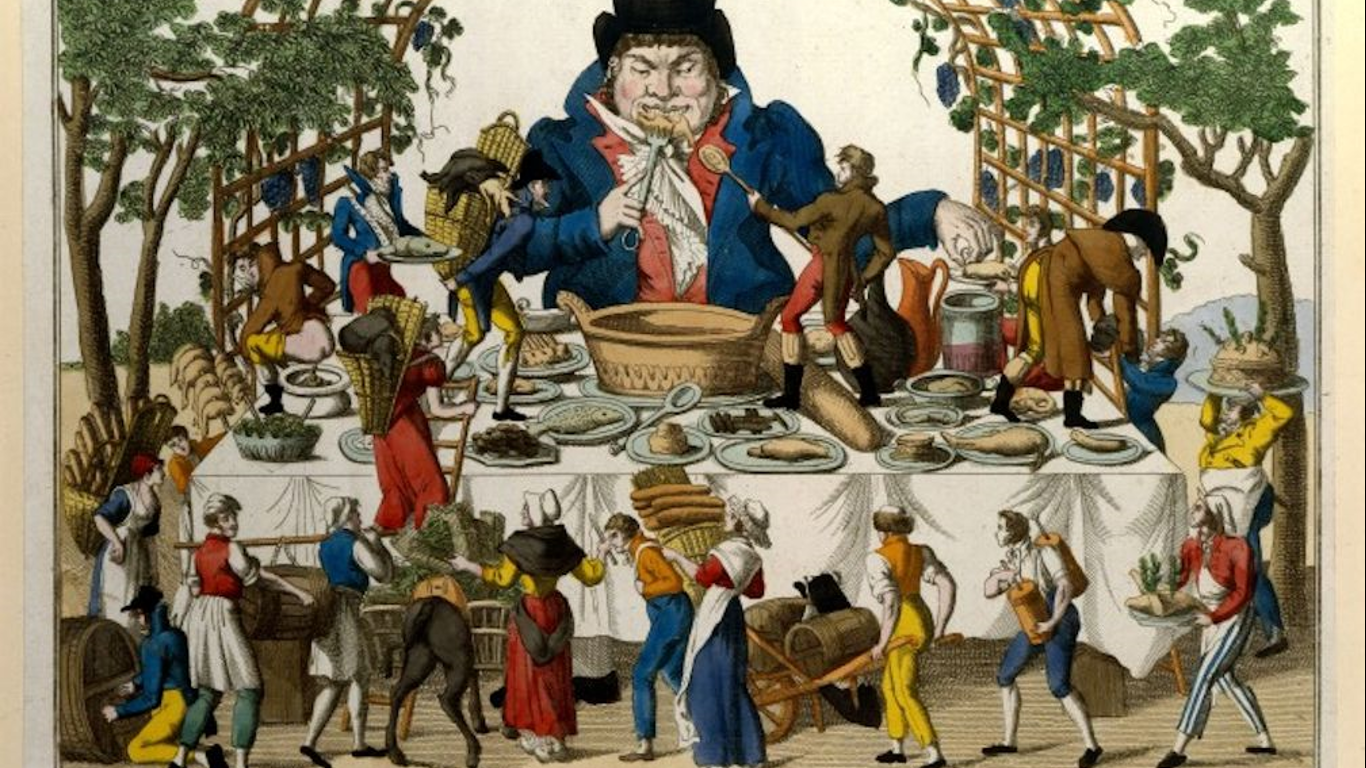 Of course, it is not only women who struggle with gluttony. Many men do, too. Schimmel tells the story of a gluttonous father who confessed having stolen and eaten his little son’s cookies when he wasn’t looking, and then had to listen to the child crying, Cookie! Cookie!
Of course, it is not only women who struggle with gluttony. Many men do, too. Schimmel tells the story of a gluttonous father who confessed having stolen and eaten his little son’s cookies when he wasn’t looking, and then had to listen to the child crying, Cookie! Cookie!
Now in order to understand better what gluttony is, we need to see first what type of good we are purportedly seeking when we fall into gluttony. Aquinas explains that there are three main categories of good, which are “the good of the soul, the good of the body, and the good of external things.”[5] What he calls the Capital Vices, which we are here referring to as the evil thoughts, are distinguished according to a disordered movement toward or away from these goods. The good of the body can be subdivided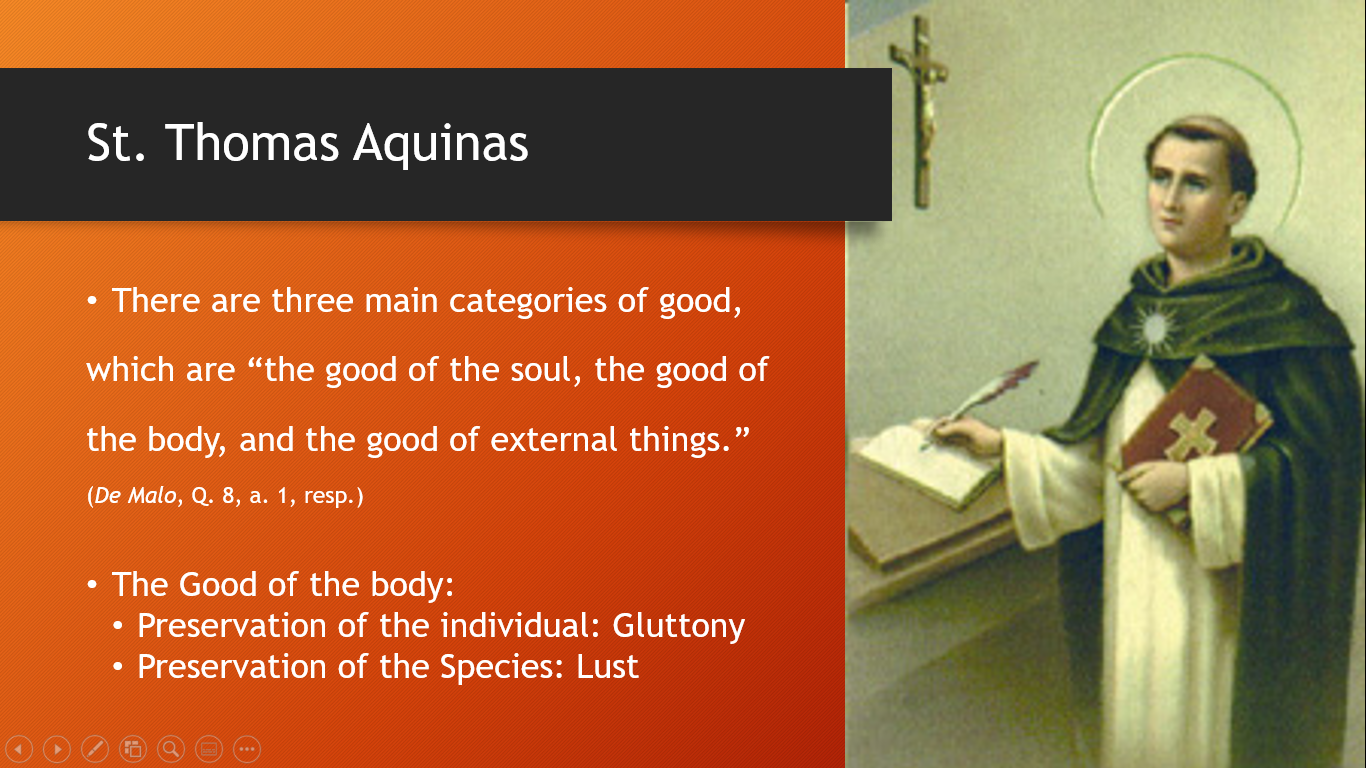 according to the preservation of the individual and the preservation of the species. With regard to the good of the body in the form of the preservation of the individual (i.e, with regard to food or drink), we find that this good is pursued inordinately [in a disordered way] by gluttony, whereas in the form of the preservation of the species (by way of sexual intercourse), it is sought in a disordered way by the vice of lust.
according to the preservation of the individual and the preservation of the species. With regard to the good of the body in the form of the preservation of the individual (i.e, with regard to food or drink), we find that this good is pursued inordinately [in a disordered way] by gluttony, whereas in the form of the preservation of the species (by way of sexual intercourse), it is sought in a disordered way by the vice of lust.
Now some vices are called “capital,” because “capital” means “head,” and these vices are the head, because they can in turn lead to many daughter vices. [6] And in fact, the vice of gluttony may itself lead to lust, among other things. Evagrius exclaims, “Continence is the parent of chastity, but gluttonous desire is the mother of lust.”[7]
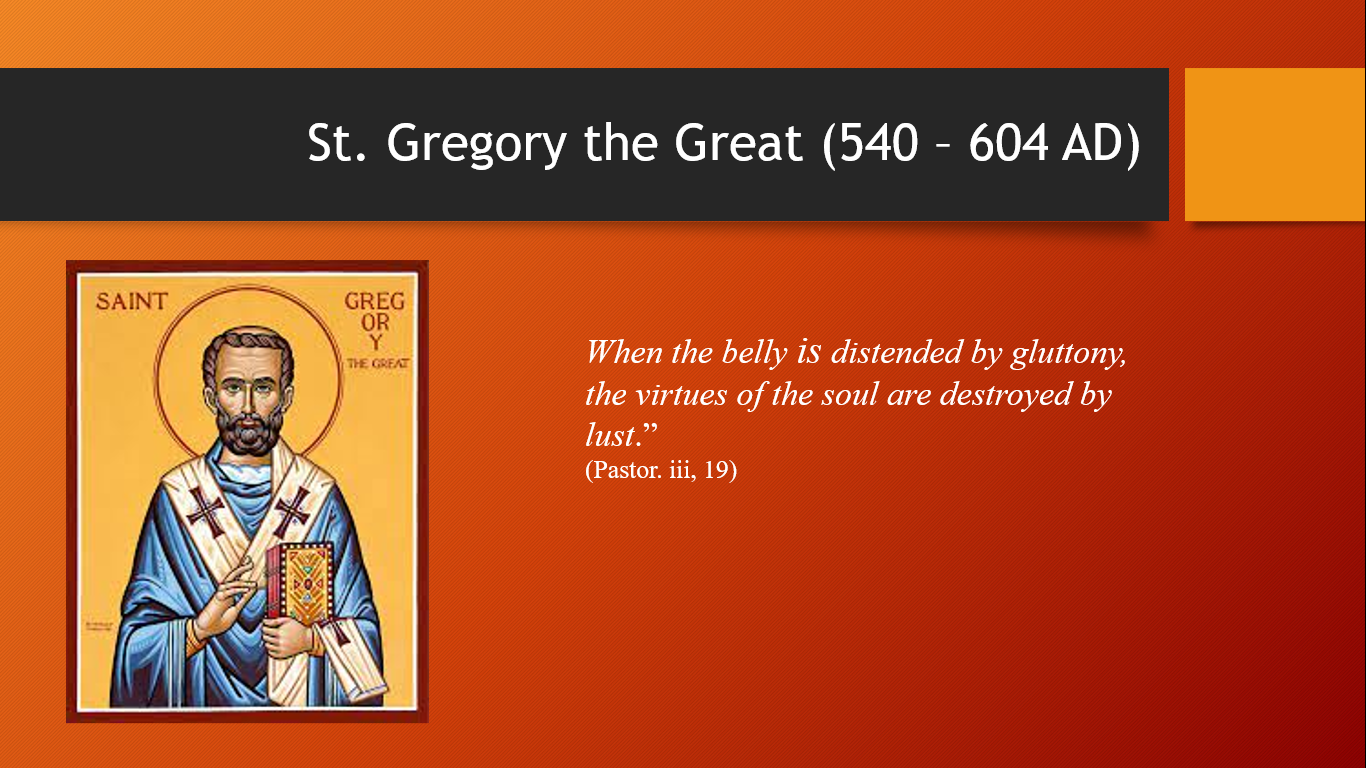 And St. Gregory the Great, Pope from 590-604, also teaches that “(Pastor. iii, 19): When the belly is distended by gluttony, the virtues of the soul are destroyed by lust.”[8]”
And St. Gregory the Great, Pope from 590-604, also teaches that “(Pastor. iii, 19): When the belly is distended by gluttony, the virtues of the soul are destroyed by lust.”[8]”
So what is gluttony then? St. Thomas explains that “Gluttony denotes, not [just] any desire of eating and drinking, but an inordinate [disordered] desire. Now desire is said to be disordered through leaving the order of reason [no longer in accord with what is reasonable]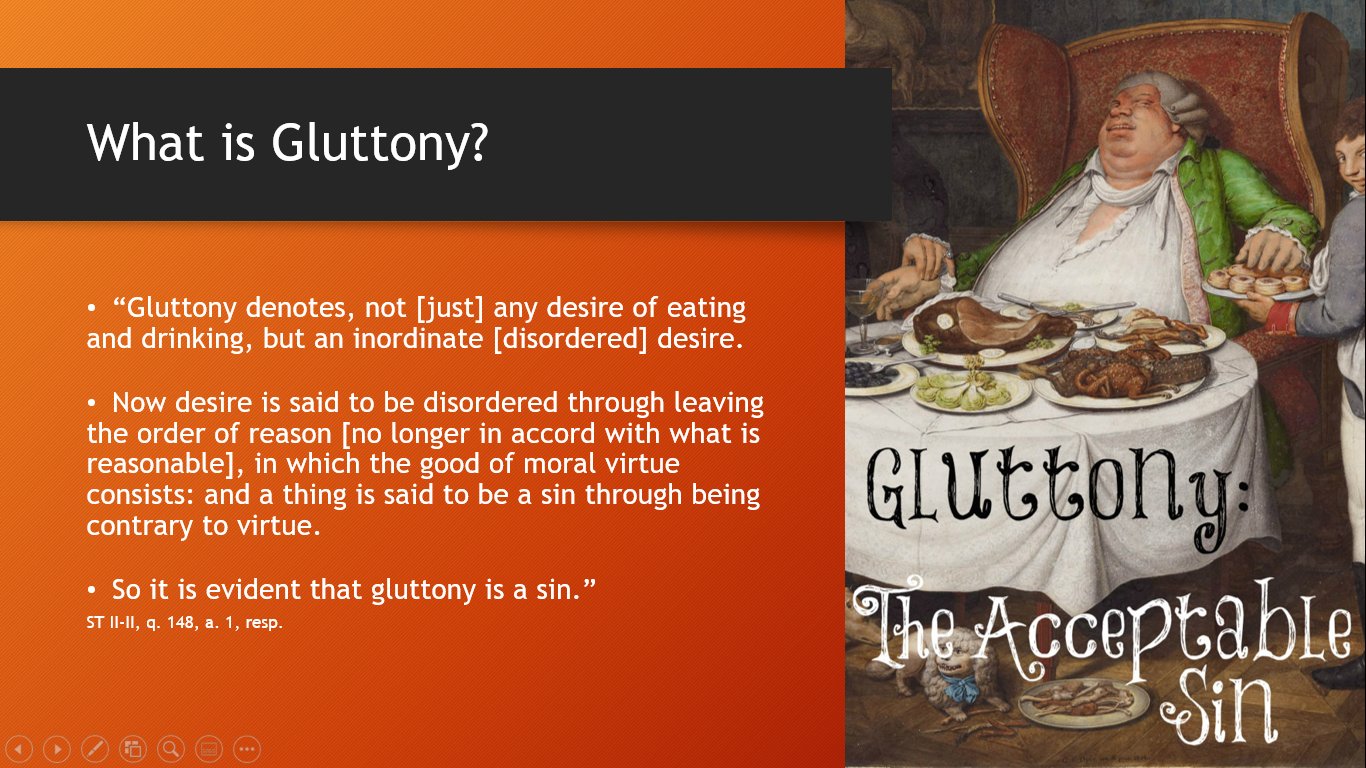 , in which the good of moral virtue consists: and a thing is said to be a sin through being contrary to virtue. So it is evident that gluttony is a sin.”[9] St. Thomas cites St. Gregory as saying (Moral. xxx, 18) “that unless we first tame the enemy dwelling within us, namely our gluttonous appetite, we have not even stood up to engage in the spiritual combat. But man’s inward enemy is sin. Therefore gluttony is a sin.”[10]
, in which the good of moral virtue consists: and a thing is said to be a sin through being contrary to virtue. So it is evident that gluttony is a sin.”[9] St. Thomas cites St. Gregory as saying (Moral. xxx, 18) “that unless we first tame the enemy dwelling within us, namely our gluttonous appetite, we have not even stood up to engage in the spiritual combat. But man’s inward enemy is sin. Therefore gluttony is a sin.”[10]
However, as we have seen, “the vice of gluttony does not [simply] regard the substance of food, but in the desire for it not being regulated by reason. So if one should exceed in the quantity of food, not from desire of food, but through deeming it necessary to him, this pertains, not to gluttony, but to some kind of inexperience [not knowing how much one needs to eat]. It is a case of gluttony only when one knowingly exceeds the measure in eating, from a desire for the pleasures of the palate.”[11]
 So “gluttony is a disordered desire for the pleasure of food.”[12] Aquinas explains that “of all the passions, the most difficult for reason to regulate is pleasure, and especially the natural pleasures that are "integral parts of our life," such as the pleasures in food and drink, without which we cannot live a human life. And so there is often a departure from the rule of reason regarding such pleasures. Therefore, there is the sin of gluttony when the desire for such pleasures goes beyond the rule of reason. And so there is the saying that "gluttony is the disordered desire to eat."
So “gluttony is a disordered desire for the pleasure of food.”[12] Aquinas explains that “of all the passions, the most difficult for reason to regulate is pleasure, and especially the natural pleasures that are "integral parts of our life," such as the pleasures in food and drink, without which we cannot live a human life. And so there is often a departure from the rule of reason regarding such pleasures. Therefore, there is the sin of gluttony when the desire for such pleasures goes beyond the rule of reason. And so there is the saying that "gluttony is the disordered desire to eat."
 And the sin of gluttony does not consist of the external acts regarding the very consumption of food except as a consequence, namely, insofar as the consumption results from an inordinate desire for food, as is also the case regarding all the other sins related to the passions…. And so it is evident that gluttony chiefly regards the passions and is contrary to moderation regarding the desires and pleasures in food and drink.”[13]
And the sin of gluttony does not consist of the external acts regarding the very consumption of food except as a consequence, namely, insofar as the consumption results from an inordinate desire for food, as is also the case regarding all the other sins related to the passions…. And so it is evident that gluttony chiefly regards the passions and is contrary to moderation regarding the desires and pleasures in food and drink.”[13]
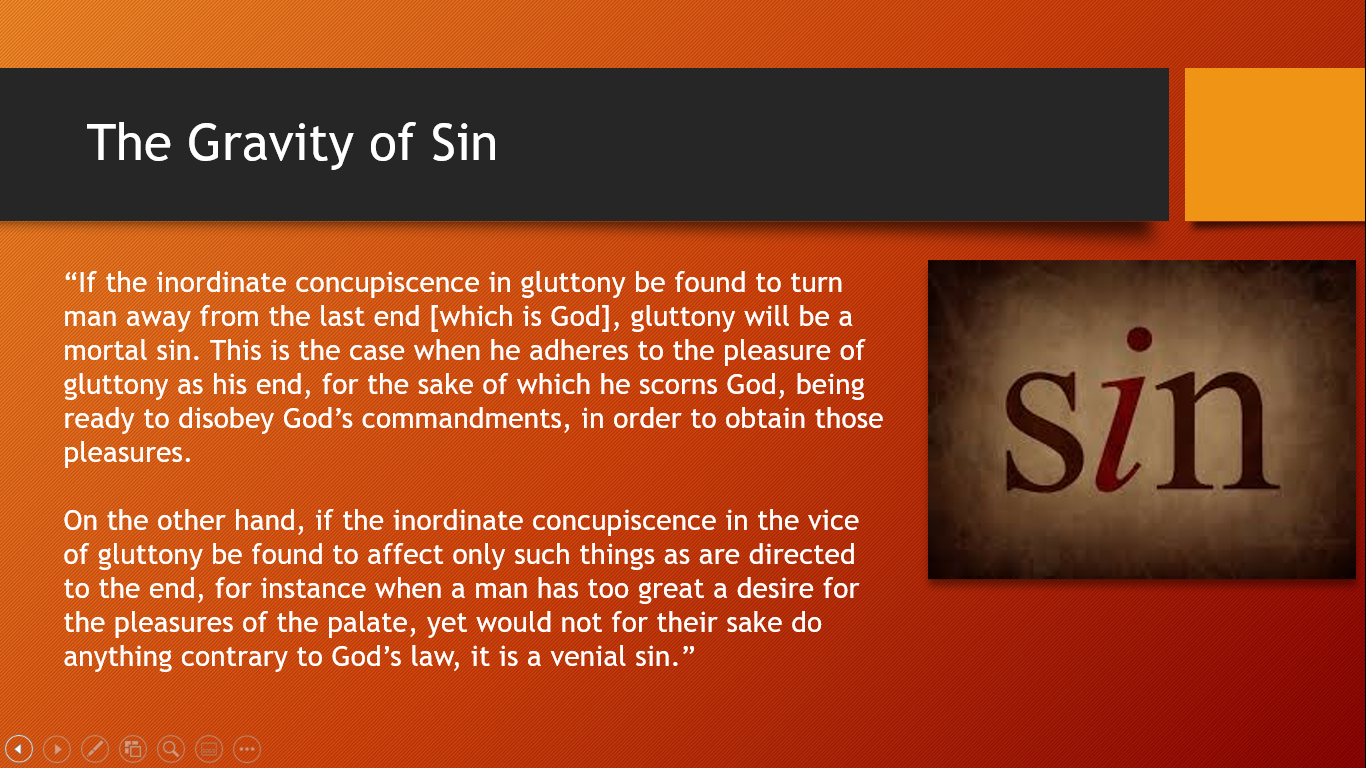 How grave is the sin of gluttony?
How grave is the sin of gluttony?
Aquinas explains that “if the inordinate concupiscence in gluttony be found to turn man away from the last end [which is God], gluttony will be a mortal sin. This is the case when he adheres to the pleasure of gluttony as his end, for the sake of which he scorns God, being ready to disobey God’s commandments, in order to obtain those pleasures. [For example, if someone, not out of need, but rather, out of gluttony, should choose to ignore the fast of the Church on Good Friday.] On the other hand, if the inordinate concupiscence in the vice of gluttony be found to affect only such things as are directed to the end, for instance when a man has too great a desire for the pleasures of the palate, yet would not for their sake do anything contrary to God’s law, it is a venial sin.”[14]
The gravity of a sin may be measured in three ways. First and foremost it depends on the matter in which the sin is committed: and in this way sins committed in connection with Divine things are the greatest. From this point of view gluttony is not the greatest sin, for it is about matters connected with the nourishment of the body. Second, the gravity of a sin depends on the person who sins, and from this point of view the sin of gluttony is diminished rather than aggravated, both on account of the necessity of taking food, and on account of the difficulty of proper discretion and moderation in such matters. Third, from the point of view of the result that follows, and in this way gluttony has a certain gravity, inasmuch as certain sins are occasioned by it.[15]
When we begin to seek pleasures of the body, that can lead us to desire more and more pleasures in the senses, so not only do we eat too much, but we may begin drinking too much, and desiring disordered sensual delights as are found in the vice of lust, as well.
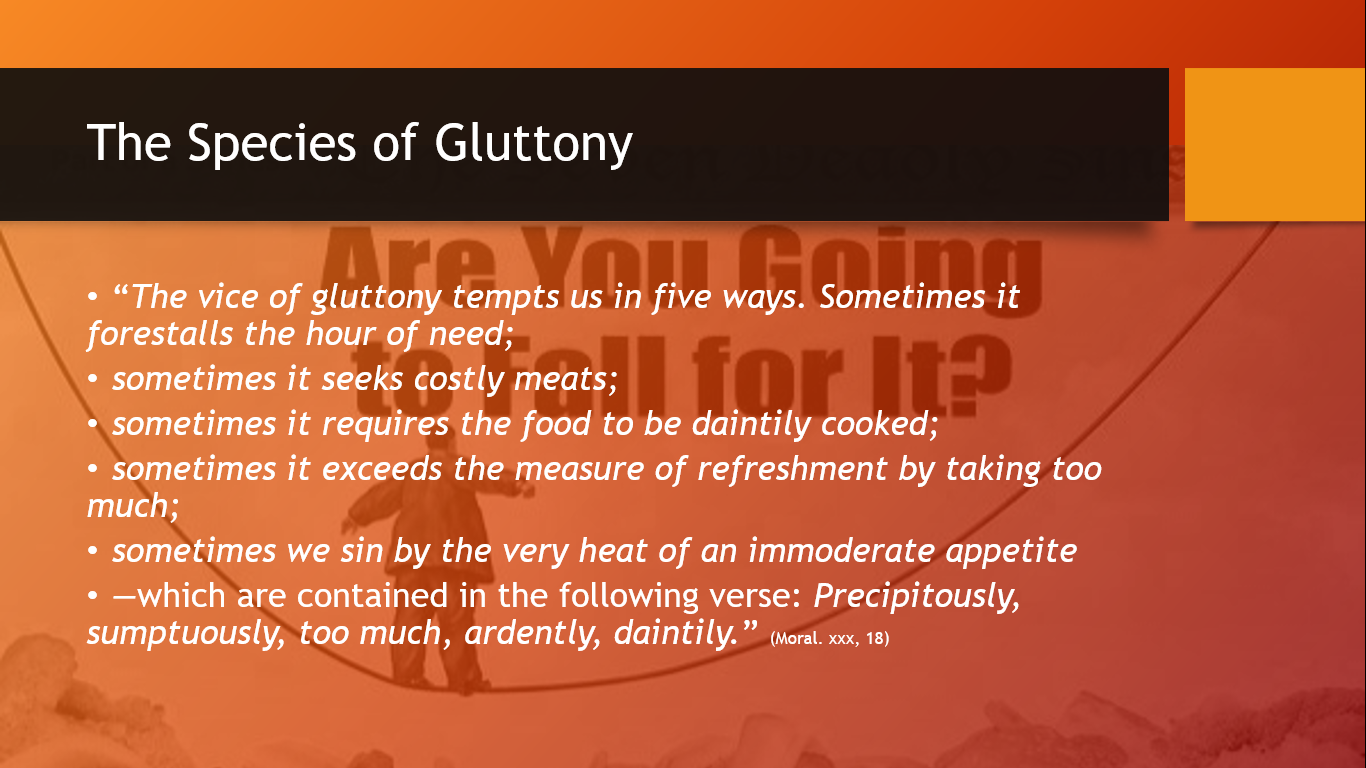 Now the vice of gluttony is not simply about eating too much. St. Gregory the Great lists the different species, or kinds, of gluttony. He says that “ (Moral. xxx, 18): The vice of gluttony tempts us in five ways. Sometimes it forestalls the hour of need; sometimes it seeks costly meats; sometimes it requires the food to be daintily cooked; sometimes it exceeds the measure of refreshment by taking too much; sometimes we sin by the very heat of an immoderate appetite—which are contained in the following verse: precipitously [too soon], sumptuously, too much, ardently, daintily.”[16]
Now the vice of gluttony is not simply about eating too much. St. Gregory the Great lists the different species, or kinds, of gluttony. He says that “ (Moral. xxx, 18): The vice of gluttony tempts us in five ways. Sometimes it forestalls the hour of need; sometimes it seeks costly meats; sometimes it requires the food to be daintily cooked; sometimes it exceeds the measure of refreshment by taking too much; sometimes we sin by the very heat of an immoderate appetite—which are contained in the following verse: precipitously [too soon], sumptuously, too much, ardently, daintily.”[16]
Aquinas explains these 5 species by saying,
Gluttony denotes inordinate concupiscence in eating. Now two things are to be considered in eating, namely the food that is eaten, and the consuming of it.
Accordingly, the inordinate concupiscence may be considered in two ways. First, with regard to the food that is taken: and thus, as regards the substance or species of food a man seeks sumptuous—i.e., costly food; as regards its quality, he seeks food prepared too nicely—i.e., daintily [fastidiously]; and as regards quantity, he exceeds by eating too much [excessively].
Second, the inordinate concupiscence is considered as to the consumption of food: either because one forestalls the proper time for eating, which is to eat by precipitation [too soon], or one fails to observe the due manner of eating, by eating ardently [passionately, ravenously].[17
 Why is gluttony such a difficult vice to overcome? Well, in part because it is natural for us to eat. We need to eat in order to live, so we cannot just stop eating. But the problem comes when our natural desire for food begins to control our lives and becomes our goal or end, or our bellies become our god, as St. Paul says. Aquinas explains, “Moral virtue maintains the good of reason against the onslaught of the passions: hence whenever we find a special motive why a passion departs from the good of reason, there is need of a special virtue. Now pleasures of the table are of a nature to withdraw man from the good of reason, both because they are so great, and because food is necessary to man, who needs it for the maintenance of life, which he desires above all other things. Therefore abstinence is a special virtue.”[18]
Why is gluttony such a difficult vice to overcome? Well, in part because it is natural for us to eat. We need to eat in order to live, so we cannot just stop eating. But the problem comes when our natural desire for food begins to control our lives and becomes our goal or end, or our bellies become our god, as St. Paul says. Aquinas explains, “Moral virtue maintains the good of reason against the onslaught of the passions: hence whenever we find a special motive why a passion departs from the good of reason, there is need of a special virtue. Now pleasures of the table are of a nature to withdraw man from the good of reason, both because they are so great, and because food is necessary to man, who needs it for the maintenance of life, which he desires above all other things. Therefore abstinence is a special virtue.”[18]
(15:50)
Remedies for Gluttony, the Virtue of Temperance, which includes the special virtues of Abstinence and Sobriety
 Now the virtue opposed to gluttony is temperance, and more specifically, the sub-virtue (or one of the virtues grouped under the heading of temperance), which is the virtue of abstinence, and its act which is fasting. Evagrius quips, “The glutton counts martyrs' feast days and the ascetic rather contemplates their lives. The fearful soldier trembles at the sound of the trumpet signalling battle and the glutton quakes when he hears the word 'abstinence'.”[19]
Now the virtue opposed to gluttony is temperance, and more specifically, the sub-virtue (or one of the virtues grouped under the heading of temperance), which is the virtue of abstinence, and its act which is fasting. Evagrius quips, “The glutton counts martyrs' feast days and the ascetic rather contemplates their lives. The fearful soldier trembles at the sound of the trumpet signalling battle and the glutton quakes when he hears the word 'abstinence'.”[19]
But one possible objection that Aquinas himself brings up and answers is that abstinence leads one to become impatient and that is not good. Or if one is doing well in abstaining from food, one also easily becomes proud, rather than humble. So it appears that abstinence is not a virtue. Aquinas responds that “those vices [impatience or pride] result from abstinence insofar as it is not [done] in accord with right reason. For right reason makes one abstain as one ought, i.e., with gladness of heart, and for the due end, i.e., for God’s glory and not one’s own.”[20]
“It is written (2 Pet 1:5, 6): Join with your faith virtue, and with virtue knowledge, and with knowledge abstinence [moderation].”[21] And St. Thomas explains, “Abstinence by its very name denotes subtraction [or withdrawal] of food. Hence the term abstinence may be taken in two ways. First, as denoting subtraction of food absolutely, and in this way it signifies neither a virtue nor a virtuous act, but something indifferent. Second, it may be taken as regulated by reason, and then it signifies either a virtuous habit or a virtuous act. This is the meaning of Peter’s words quoted above, where he says that we ought to join abstinence with knowledge, namely that in abstaining from food a man should act with due regard for those among whom he lives, for his own person, and for the requirements of health.”[22] So this is important. If abstinence is to be a virtue, it ought to be carried out virtuously, with a view not only for one’s own good, or for one’s own health, but also for the love of one’s neighbor (and of course for the love of God), which means that when we abstain from food, we must do it in a way that involves kindness, patience, and humility.
Now just as one vice can lead to another (as gluttony can give rise to lust), so also the virtues are connected. For this reason, St. Thomas says that abstinence from food can also help one grow in the virtue of chastity, which is the virtue opposed to lust. He explains, “The body is chastised by means of abstinence, not only against the allurements of lust, but also against those of gluttony: since by abstaining a man gains strength for overcoming the onslaughts of gluttony, which increase in force the more he yields to them. [The more we yield to this unreasonable passion, or desire, for food, the stronger it becomes and the more it controls us].”[23]
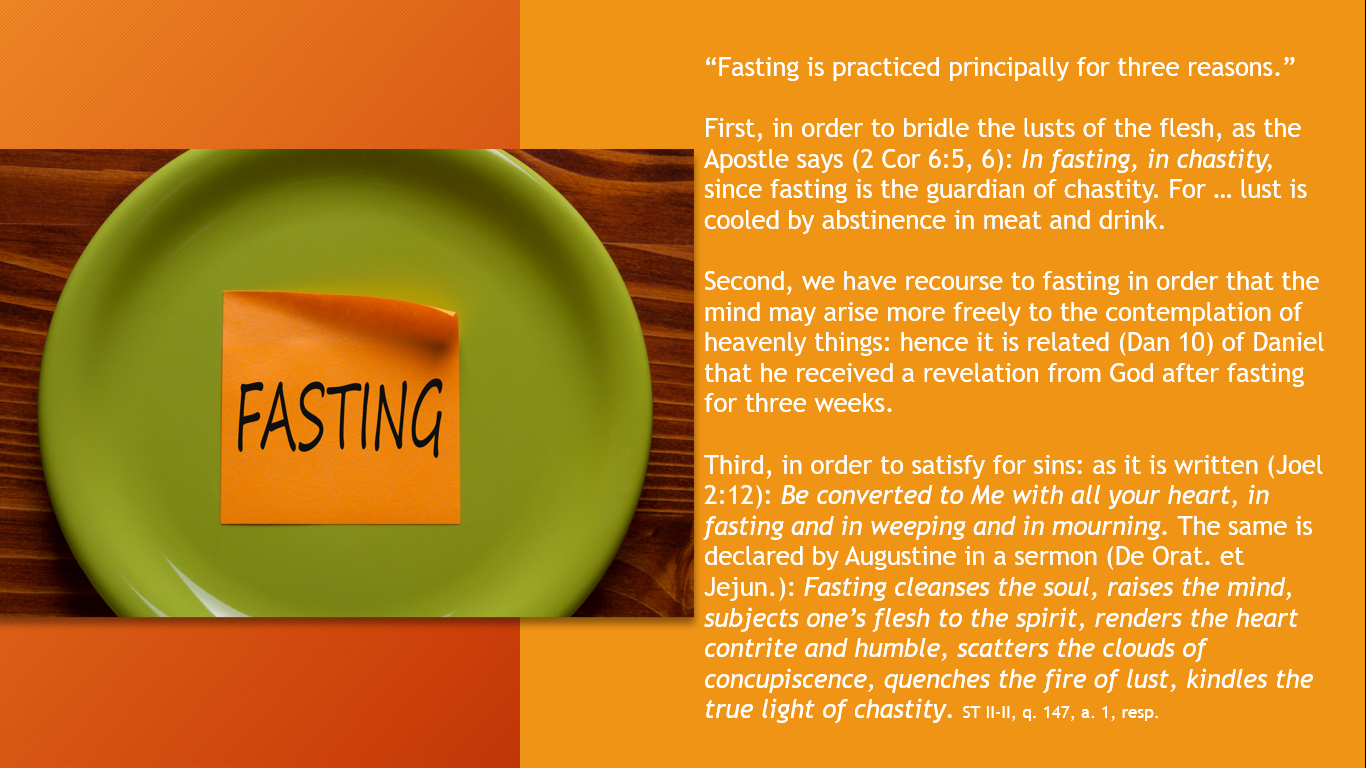 And as I mentioned, according to St. Thomas, fasting is an act of the virtue of abstinence. He explains that “fasting is practiced principally for three reasons.”
And as I mentioned, according to St. Thomas, fasting is an act of the virtue of abstinence. He explains that “fasting is practiced principally for three reasons.”
First, in order to bridle the lusts of the flesh, as the Apostle says (2 Cor 6:5, 6): In fasting, in chastity, since fasting is the guardian of chastity. For, … lust is cooled by abstinence in meat and drink.
Second, we have recourse to fasting in order that the mind may arise more freely to the contemplation of heavenly things: hence it is related (Dan 10) of Daniel that he received a revelation from God after fasting for three weeks.
Third, in order to satisfy for sins: as it is written (Joel 2:12): Be converted to Me with all your heart, in fasting and in weeping and in mourning. The same is declared by Augustine in a sermon (De Orat. et Jejun.): Fasting cleanses the soul, raises the mind, subjects one’s flesh to the spirit, renders the heart contrite and humble, scatters the clouds of concupiscence, quenches the fire of lust, kindles the true light of chastity.[24]
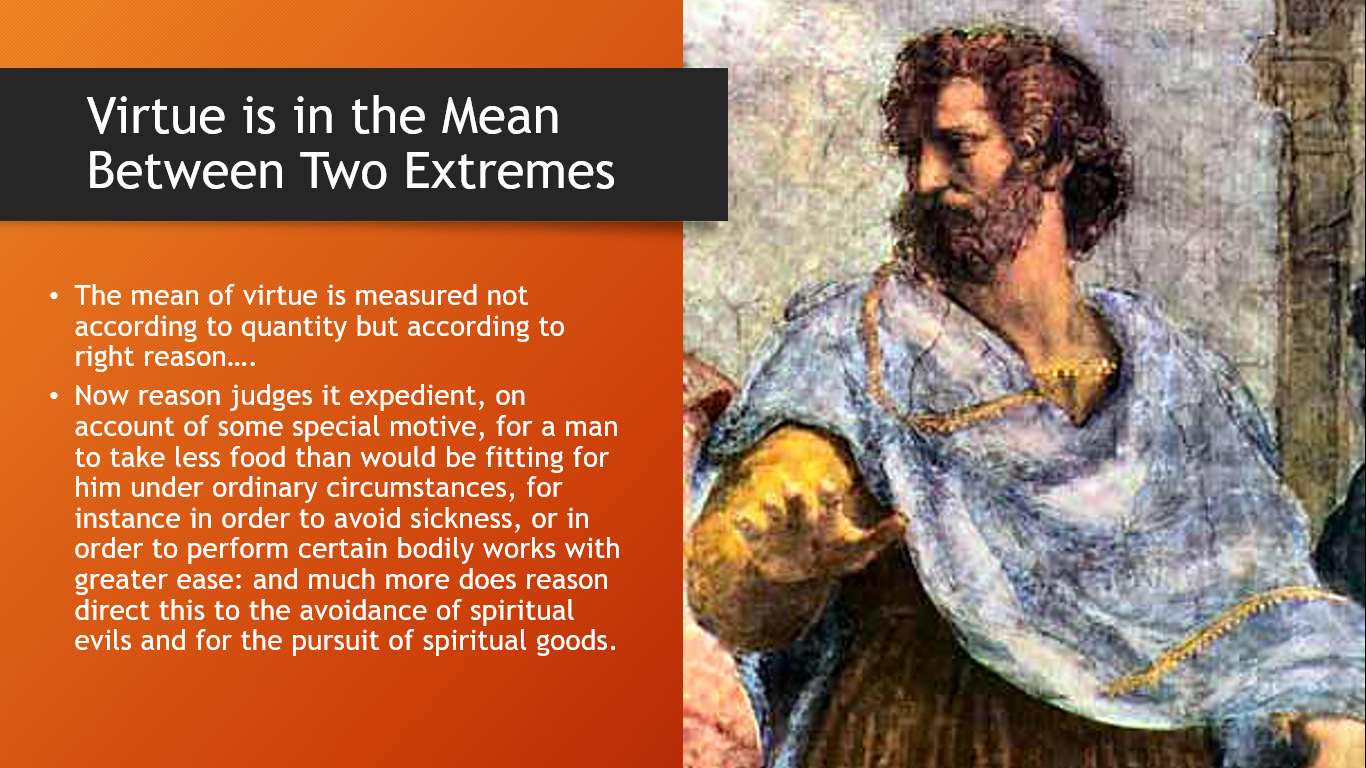 Aquinas, following Aristotle, explains that the virtue is in the mean, or the middle ground, between two extremes, that is between excess on the one hand, and defect, on the other. He explains,
Aquinas, following Aristotle, explains that the virtue is in the mean, or the middle ground, between two extremes, that is between excess on the one hand, and defect, on the other. He explains,
The mean of virtue is measured not according to quantity but according to right reason…. Now reason judges it expedient, on account of some special motive, for a man to take less food than would be fitting for him under ordinary circumstances, for instance in order to avoid sickness, or in order to perform certain bodily works with greater ease: and much more does reason direct this to the avoidance of spiritual evils and for the pursuit of spiritual goods.
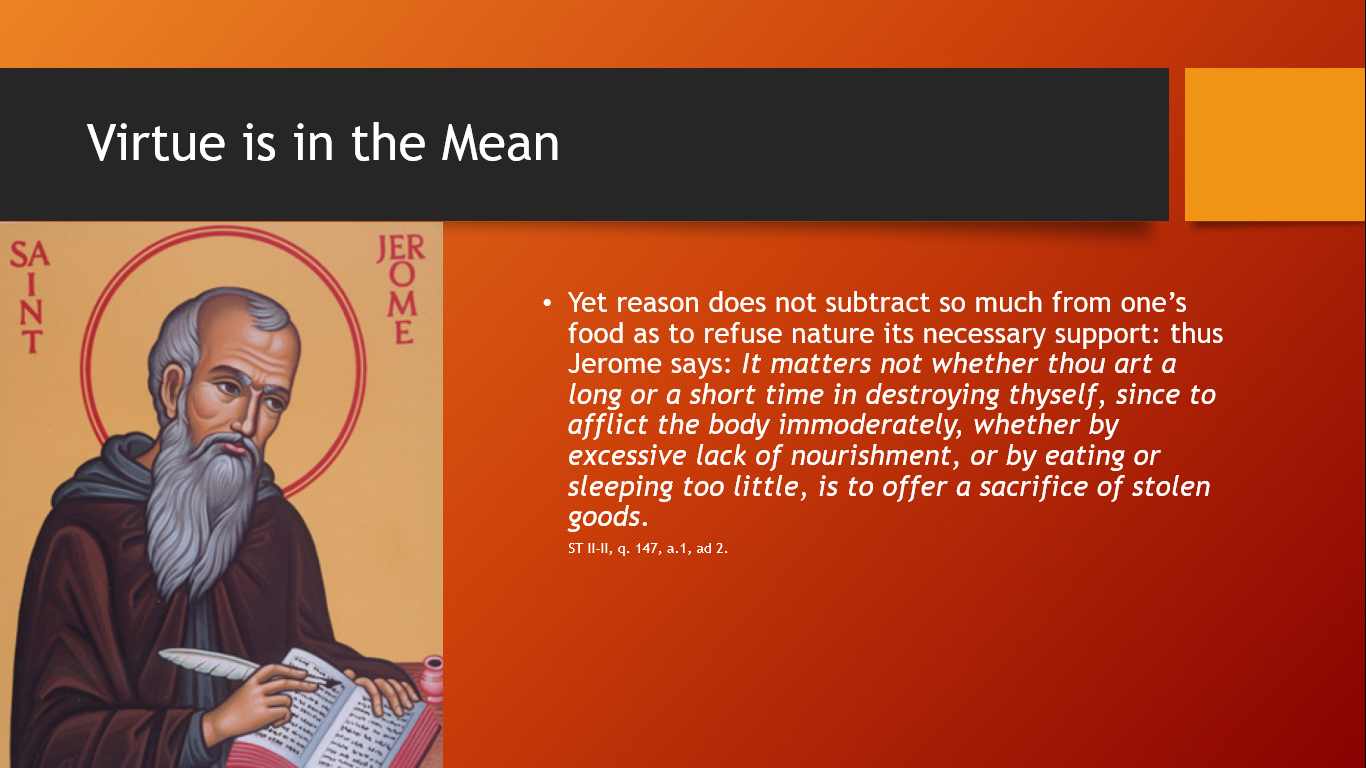 Yet reason does not subtract so much from one’s food as to refuse nature its necessary support: thus Jerome says: It matters not whether thou art a long or a short time in destroying thyself, since to afflict the body immoderately, whether by excessive lack of nourishment, or by eating or sleeping too little, is to offer a sacrifice of stolen goods. In like manner right reason does not subtract so much from a man’s food as to render him incapable of fulfilling his duty.[25]
Yet reason does not subtract so much from one’s food as to refuse nature its necessary support: thus Jerome says: It matters not whether thou art a long or a short time in destroying thyself, since to afflict the body immoderately, whether by excessive lack of nourishment, or by eating or sleeping too little, is to offer a sacrifice of stolen goods. In like manner right reason does not subtract so much from a man’s food as to render him incapable of fulfilling his duty.[25]
So the right reason of abstinence or fasting is found between the excessive intake of food, on the one hand, and the defect of eating too little, in a way that would be harmful to one’s health or prevent one from carrying out one’s daily tasks, on the other hand. This is what St. Thomas calls the “rule of reason” with respect to food. 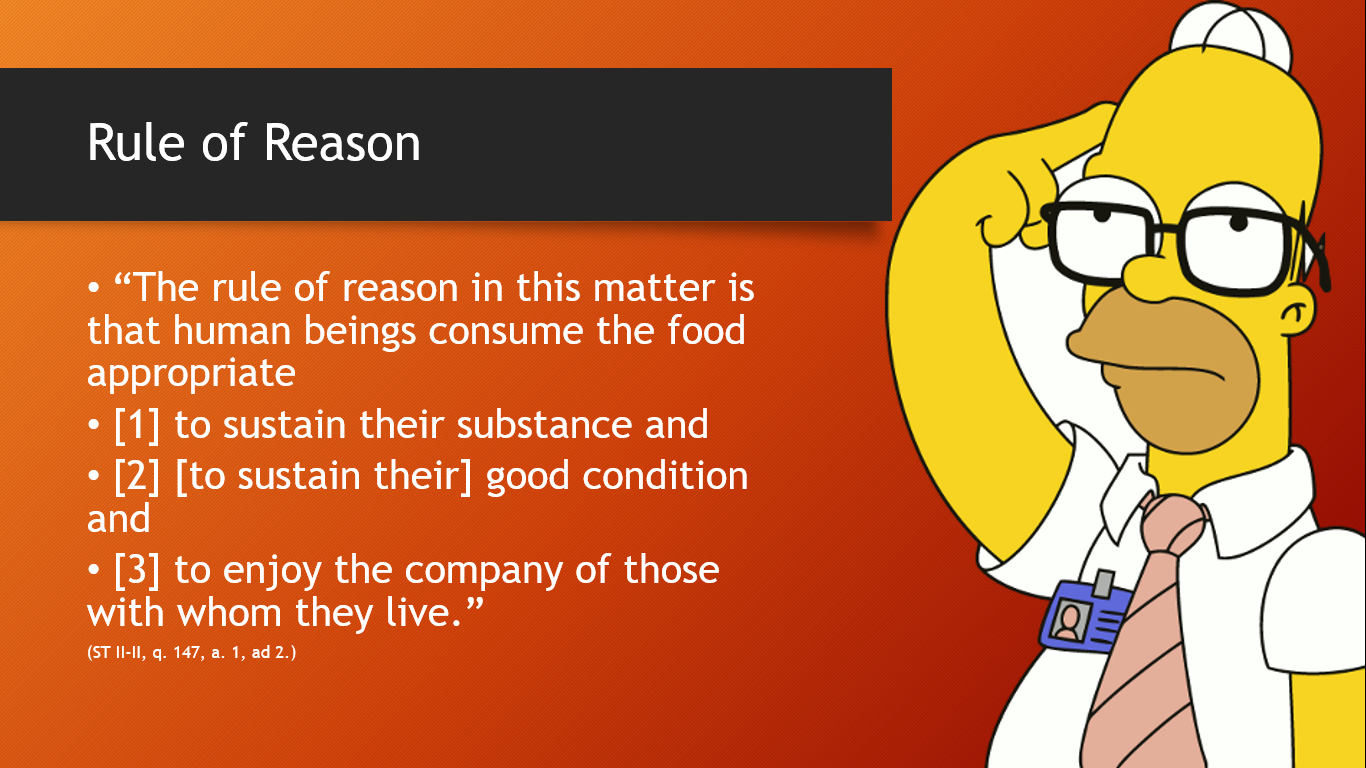 He explains that “The rule of reason in this matter is that human beings consume the food appropriate [1] to sustain their substance [life] and [2] good condition [health] and [3] to enjoy the company of those with whom they live…. Therefore, when human beings desire and consume food according to this rule of reason, they consume food according to their need. And when they exceed this limit, they go beyond the rule of reason and depart from the virtuous mean in order to satisfy their appetite for pleasure.”[26]
He explains that “The rule of reason in this matter is that human beings consume the food appropriate [1] to sustain their substance [life] and [2] good condition [health] and [3] to enjoy the company of those with whom they live…. Therefore, when human beings desire and consume food according to this rule of reason, they consume food according to their need. And when they exceed this limit, they go beyond the rule of reason and depart from the virtuous mean in order to satisfy their appetite for pleasure.”[26]
How then does one combat gluttony?  Well, every sin begins in our thoughts, which is why we are speaking in this series about the 8 evil thoughts. St. Thomas explains that
Well, every sin begins in our thoughts, which is why we are speaking in this series about the 8 evil thoughts. St. Thomas explains that
Sins are divided into these three, viz., sins of thought, word, and deed, … The first beginning of sin is its foundation, as it were, in the sin of thought; the second degree is the sin of word, insofar as one is ready to break out into a declaration of his thought; while the third degree consists in the consummation of the deed [action]. Consequently these three differ in respect of the various degrees of sin. Nevertheless it is evident that these three belong to the one complete species of sin, since they proceed from the same motive. For the angry man, through desire of vengeance, is at first disturbed in thought, then he breaks out into words of abuse, and lastly he goes on to wrongful deeds; and the same applies to lust and to any other sin.” (ST I-II, q. 72, a. 7, resp.) including gluttony.
What happens with gluttony is that we begin to focus our minds on food, especially images of food, and arouse in ourselves a passion, or disordered desire for food that can begin then to control our thoughts, words, and actions.
So the key to overcoming disordered passions that lead to sin lies in regulating our thoughts, choosing what to think or not to think about. This is particularly important where our passions or emotions are involved.  As we have seen, gluttony is a disordered desire for the pleasures of the palate. We experience pleasure when we are able to enjoy or rest in something that we love and desire. And a desire for pleasure is a kind of passion that can be good if well-ordered according to reason, that is, in accordance with what we know to be a true good for us, but it can turn into a compulsion or addiction, or other form of vice if we begin to desire pleasure in disordered ways, or desire pleasure in things that are not really good for us, or desire the pleasure so much that it becomes a source of sin for us.
As we have seen, gluttony is a disordered desire for the pleasures of the palate. We experience pleasure when we are able to enjoy or rest in something that we love and desire. And a desire for pleasure is a kind of passion that can be good if well-ordered according to reason, that is, in accordance with what we know to be a true good for us, but it can turn into a compulsion or addiction, or other form of vice if we begin to desire pleasure in disordered ways, or desire pleasure in things that are not really good for us, or desire the pleasure so much that it becomes a source of sin for us.
Now of course, as I’ve said, food of itself is a good (and is necessary for us, in fact). It is a gift that God has given us, which is why we pray that God bless our food at the beginning of a meal, and often thank him for it at the end of a meal. But like every good gift, it can be abused when it becomes the be-all and end-all of our lives. In other words, our desire for food becomes disordered when we begin to subordinate other more important things to the pleasure of food, and it takes control over us, such that the passion for food may even begin to take the place of God.
 So I may love chocolate, and begin to desire the piece of chocolate as something that is good, but if I desire the pleasure of chocolate so much that I decide to eat a piece of it on Good Friday, a day in which the Church commands that I fast in honor of the suffering and death of my Lord, then I have loved chocolate more than I desire to be obedient to the Church, and by knowingly and willingly eating the chocolate in disobedience to the Church and God, I have shown that at least in a small way, I have desired chocolate more than I desire Christ himself. This then is the sin of gluttony.
So I may love chocolate, and begin to desire the piece of chocolate as something that is good, but if I desire the pleasure of chocolate so much that I decide to eat a piece of it on Good Friday, a day in which the Church commands that I fast in honor of the suffering and death of my Lord, then I have loved chocolate more than I desire to be obedient to the Church, and by knowingly and willingly eating the chocolate in disobedience to the Church and God, I have shown that at least in a small way, I have desired chocolate more than I desire Christ himself. This then is the sin of gluttony.
So how do I overcome this passion of gluttony? I can begin by turning my thoughts elsewhere. Rather than fixate my thoughts on the chocolate, and letting my imagination run wild thinking about bathing in streams of chocolate all around me, I would do much better to focus my attention on a crucifix  and thinking about how God loved me so much as to become man and to suffer such horrendous things and die for me, in order to save me from sin. In changing the focus of my thoughts, I can change my desires and the passions that arise within me, so that rather than allowing myself to feel such love and desire for chocolate and such anguish at not being allowed to eat any, I will instead begin to feel sorrow at Christ’s suffering and my own sin, as well as to feel love for him who so loved me first.
and thinking about how God loved me so much as to become man and to suffer such horrendous things and die for me, in order to save me from sin. In changing the focus of my thoughts, I can change my desires and the passions that arise within me, so that rather than allowing myself to feel such love and desire for chocolate and such anguish at not being allowed to eat any, I will instead begin to feel sorrow at Christ’s suffering and my own sin, as well as to feel love for him who so loved me first.
 Some other practical things that might help would be to do the opposite of the five species of gluttony that I listed above. Instead of eating precipitously, or too soon, I can fix set meal times and wait until these times to eat. Instead of purchasing costly, sumptuous foods, I can keep track of my monthly receipts and see how much I spend, and how much I reasonably think I should spend on food each month, except for special occasions such as Christmas or Easter or birthdays, for example. Instead of eating too much, especially too much of rich food, I can make sure I only allow myself one plate of food, that should include even those foods that I like less, such as vegetables or fruit. Instead of eating too ardently, or ravenously, I can make sure to cut my food into small pieces, and eat one bite at a time, finishing each bite before taking another. Instead of becoming too fastidious about how my food is prepared just so, with all the right spices and high quality, I can sometimes eat plainer, less expensive, foods, on Fridays, for example, and choose not add salt and pepper to meals cooked for me by others.
Some other practical things that might help would be to do the opposite of the five species of gluttony that I listed above. Instead of eating precipitously, or too soon, I can fix set meal times and wait until these times to eat. Instead of purchasing costly, sumptuous foods, I can keep track of my monthly receipts and see how much I spend, and how much I reasonably think I should spend on food each month, except for special occasions such as Christmas or Easter or birthdays, for example. Instead of eating too much, especially too much of rich food, I can make sure I only allow myself one plate of food, that should include even those foods that I like less, such as vegetables or fruit. Instead of eating too ardently, or ravenously, I can make sure to cut my food into small pieces, and eat one bite at a time, finishing each bite before taking another. Instead of becoming too fastidious about how my food is prepared just so, with all the right spices and high quality, I can sometimes eat plainer, less expensive, foods, on Fridays, for example, and choose not add salt and pepper to meals cooked for me by others.
Of course, although it is possible for one to acquire a certain natural virtue of temperance and abstinence by repeatedly performing acts of fasting or careful regulation of oneself according to the Rule of Reason, there is also a supernatural infused virtue of temperance that we receive in the gift of grace. This is the difference between someone who watches their food intake simply in order to lose weight, and someone who fasts out of love for God, in order to live in accordance with God’s will.  Aquinas explains that “it is evident that the mean that is appointed …according to the rule of human reason, is seen under a different aspect from the mean which is fixed according to Divine rule. For instance, in the consumption of food, the mean fixed by human reason, is that food should not harm the health of the body, nor hinder the use of reason: whereas, according to the Divine rule, it behooves man to chastise his body, and bring it into subjection (1 Cor 9:27), by abstinence in food, drink and the like. It is therefore evident that infused and acquired temperance differ in species; and the same applies to the other virtues.”[27]
Aquinas explains that “it is evident that the mean that is appointed …according to the rule of human reason, is seen under a different aspect from the mean which is fixed according to Divine rule. For instance, in the consumption of food, the mean fixed by human reason, is that food should not harm the health of the body, nor hinder the use of reason: whereas, according to the Divine rule, it behooves man to chastise his body, and bring it into subjection (1 Cor 9:27), by abstinence in food, drink and the like. It is therefore evident that infused and acquired temperance differ in species; and the same applies to the other virtues.”[27]
 Because of our weakness we can only overcome our passions and faults and practice virtue meritorious for heaven by the grace that comes to us through Christ, so the most important thing we can do is to pray and ask God for the grace to come to know ourselves as we really are, not in order to become despondent, but rather, in order that we may not trust in ourselves, but in God. The more we turn to God, the more we will grow in love of Him and He will fill us with His grace, transforming us more and more from within, making us like Himself by grace in this life, and in the glory of the eternal life to come.
Because of our weakness we can only overcome our passions and faults and practice virtue meritorious for heaven by the grace that comes to us through Christ, so the most important thing we can do is to pray and ask God for the grace to come to know ourselves as we really are, not in order to become despondent, but rather, in order that we may not trust in ourselves, but in God. The more we turn to God, the more we will grow in love of Him and He will fill us with His grace, transforming us more and more from within, making us like Himself by grace in this life, and in the glory of the eternal life to come. 
[1] https://firstthoughtsofgod.com/2017/10/20/evagrius-ponticus-the-eight-evil-thoughts-logismoi/ This list was intended to serve a diagnostic purpose: to help his readers (fellow desert monks) identify the process of temptation, their own strengths and weaknesses, and the remedies available for overcoming temptation.”
[2] Evagrius Ponticus, Eight Vices, n. 1.
[3] Aquinas, Comm on Rm 16, l. 2, n. 1218.
[4] Solomon Schimmel, The Seven Deadly Sins (Oxford: Oxford University Press), 155.
[5] De Malo, Q. 8, a. 1, resp.
[6] So according to St. Gregory the Great, “From gluttony are propagated foolish mirth, scurrility, uncleanness, babbling, dullness of sense in understanding.” But the vice that chiefly arises from gluttony, is another capital vice, which is lust. Aquinas explains these daughters of gluttony, saying,
“Gluttony consists properly in an immoderate pleasure in eating and drinking. Wherefore those vices are reckoned among the daughters of gluttony, which are the results of eating and drinking immoderately. These may be accounted for either on the part of the soul or on the part of the body. On the part of the soul these results are of four kinds. First, as regards the reason, whose keenness is dulled by immoderate meat and drink, and in this respect we reckon as a daughter of gluttony, dullness of sense in the understanding, on account of the fumes of food disturbing the brain. Even so, on the other hand, abstinence conduces to the penetrating power of wisdom, according to Eccles. 2:3, I thought in my heart to withdraw my flesh from wine, that I might turn my mind in wisdom.
Second, as regards the appetite, which is disordered in many ways by immoderation in eating and drinking, as though reason were fast asleep at the helm, and in this respect unseemly joy is reckoned, because all the other inordinate passions are directed to joy or sorrow, as stated in Ethic. ii, 5. To this we must refer the saying of 3 Esdr. 3:20, that wine . . . gives every one a confident and joyful mind.
Third, as regards inordinate words, and thus we have loquaciousness, because as Gregory says (Pastor. iii, 19), unless gluttons were carried away by immoderate speech, that rich man who is stated to have feasted sumptuously every day would not have been so tortured in his tongue.
Fourth, as regards inordinate action, and in this way we have scurrility, i.e., a kind of levity resulting from lack of reason, which is unable not only to bridle the speech, but also to restrain outward behavior. Hence a gloss on Eph. 5:4, Or foolish talking or scurrility, says that fools call this geniality—i.e., jocularity, because it is wont to raise a laugh. Both of these, however, may be referred to the words which may happen to be sinful, either by reason of excess which belongs to loquaciousness, or by reason of unbecomingness, which belongs to scurrility.
On the part of the body, mention is made of uncleanness, which may refer either to the inordinate emission of any kind of superfluities, or especially to the emission of the semen. Hence a gloss on Eph. 5:3, But fornication and all uncleanness, says: That is, any kind of incontinence that has reference to lust.”
[7] Evagrius Ponticus, Eight Vices, n. 4.
[8] ST II-II, q. 148, a. 1, ad 4.
[9] ST II-II, q. 148, a. 1, resp.
[10] ST II-II, q. 148, a. 1, s.c.
[11] ST II-II, q. 148, a. 1, ad 2.
[12] De Malo, q. 14, a. 2, resp.
[13] De Malo, q. 14, a. 1, resp.
[14] ST II-II, q. 148, a. 2, resp.
[15] ST II-II, q. 148, a. 3, resp.
[16] ST II-II, q. 148, a. 4, obj. 1.
[17] ST II-II, q. 148, a. 4, resp.
[18] ST II-II, q. 146, a. 2, resp.
[19] Evagrius Ponticus, Eight Vices, n. 2.
[20] ST II-II, q. 146, a. 1, ad 4.
[21] ST II-II, q. 146, a. 1, s.c.
[22] ST II-II, q. 146, a. 1, resp.
[23] ST II-II, q. 146, a. 2, ad 2.
[24] ST II-II, q. 147, a. 1, resp.
[25] ST II-II, q. 147, a. 1, ad 2.
[26] De Malo, q. 14, a. 1, ad 1.
[27] ST II-II, q. 63, a. 4, resp.